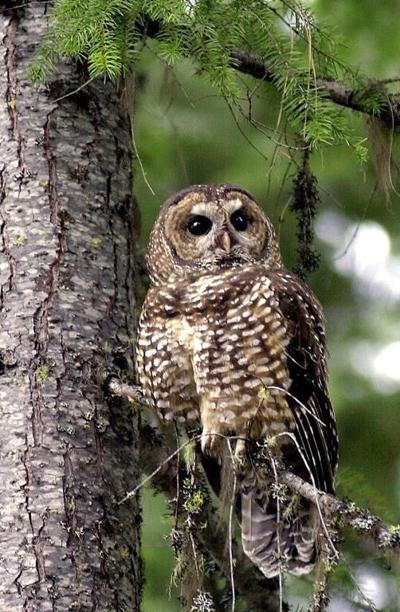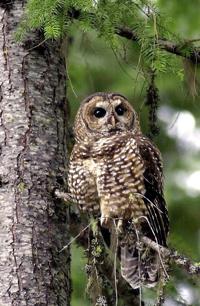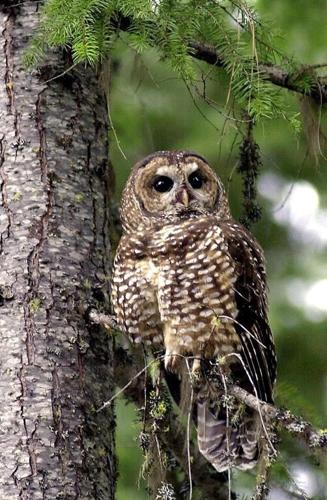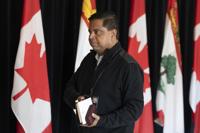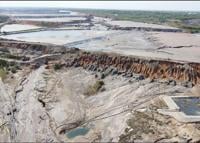VANCOUVER - An environmental group is challenging the federal government's handling of protection for the northern spotted owl, calling an eight-month delay in deciding on an emergency order to prevent logging in the endangered owl's habitat in British Columbia the latest "failure" in efforts to save it.
The Wilderness Committee, represented by environmental law charity Ecojustice, appeared in Federal Court in Vancouver, telling Justice Yvan Roy that Environment Minister Steven Guilbeault originally said in January that he would recommend an emergency order to cabinet, which he did in late September.
Ottawa announced earlier this month that it is not going ahead with an emergency order despite Guilbeault's recommendation.
The Wilderness Committee's challenge is nevertheless proceeding as its lawyers argue the delay contravened the minister's responsibility under the Species at Risk Act to address the imminent threat to spotted owl protection posed by old-growth logging in B.C.'s Fraser Canyon.
"It would fundamentally undermine the entire point of an emergency order, which is to prevent the sudden and brutal disappearance of a species," Ecojustice lawyer Kegan Pepper-Smith told the court on Wednesday.
There is only one known wild-born spotted owl left in the Fraser Canyon, while two more captive-bred animals were released earlier this year in the area.
Pepper-Smith said the Wilderness Committee originally petitioned Ottawa on the issue of spotted owl habitat in October 2022, and the timing was chosen because it was "well ahead" of the 2023 logging season.
The spotted owl relies on old-growth forests to survive and the federal government's own assessment found that about 2,500 hectaresof its habitathad "high-to-very-high potential" of being harvested this year, Pepper-Smith said, adding the logging would render the recovery of the wild population impossible.
"In other words, this is an emergency (where) there are specifically identified threats that are imminent," he said.
Guilbeault had wanted to consult with the B.C. government and First Nations before making any recommendation to cabinet, but the Species at Risk Act does not include language requiring the province be consulted in an emergency, Pepper-Smith said.
"Absolutely, the Minister can conduct economic analysis," he said. "But it must be in accordance to a timeline responsive to the threats."
The judge questioned Pepper-Smith on the issue of a "timely" federal response in a matter covering a large area of land.
"How do you force your partners to come to you sooner rather than later?" Roy asked.
"To say that, when (the minister) had his opinion in January, that he should have made the recommendations in February, I'm not sure that's realistic."
Roy also asked if there is a specific formula that Guilbeault could have used to determine what constituted a timely release of his recommendation.
Still, Roy said it "made sense" for people to take issue with an eight-month delay and questioned why the process had to take that period of time to complete.
Justice Department lawyer Aileen Jones said while Guilbeault had to consider the threat logging imposes on the spotted owls, Ottawa also had to consider its "collaborative" relationship with the B.C. government, since the endangered species' population has depleted to a point where human intervention is required.
Jones said B.C. plays a crucial role within its jurisdiction in the owls' recovery efforts, and collaboration between the levels of government is vital.
"It would undermine the broad relationship and could have broader impacts on the specie's recovery," Jones said of any recommendation without consultation.
The Wilderness Committee's challenge originally included a request for the court to compel Guilbeault to issue his recommendation before he ended up doing so.
That portion of the challenge was dropped after Ottawa's announcement that cabinet would not go ahead with the emergency order.
The B.C. government has said there were once up to 1,000 spotted owls in the province.
It has said the release of three birds into the wild last year resulted in two of them being found dead of unknown causes, while the third was found injured.
The injured owl later recovered in captivity and was one of the two animals released into the wild this year.
The spotted owl holds cultural significance to a number of First Nations in B.C., which view the bird as a messenger of the health of the old-growth forest ecosystems they rely on for survival.
The hearing is expected to continue Thursday.
This report by ºÚÁϳԹÏÍø was first published Oct. 18, 2023.

